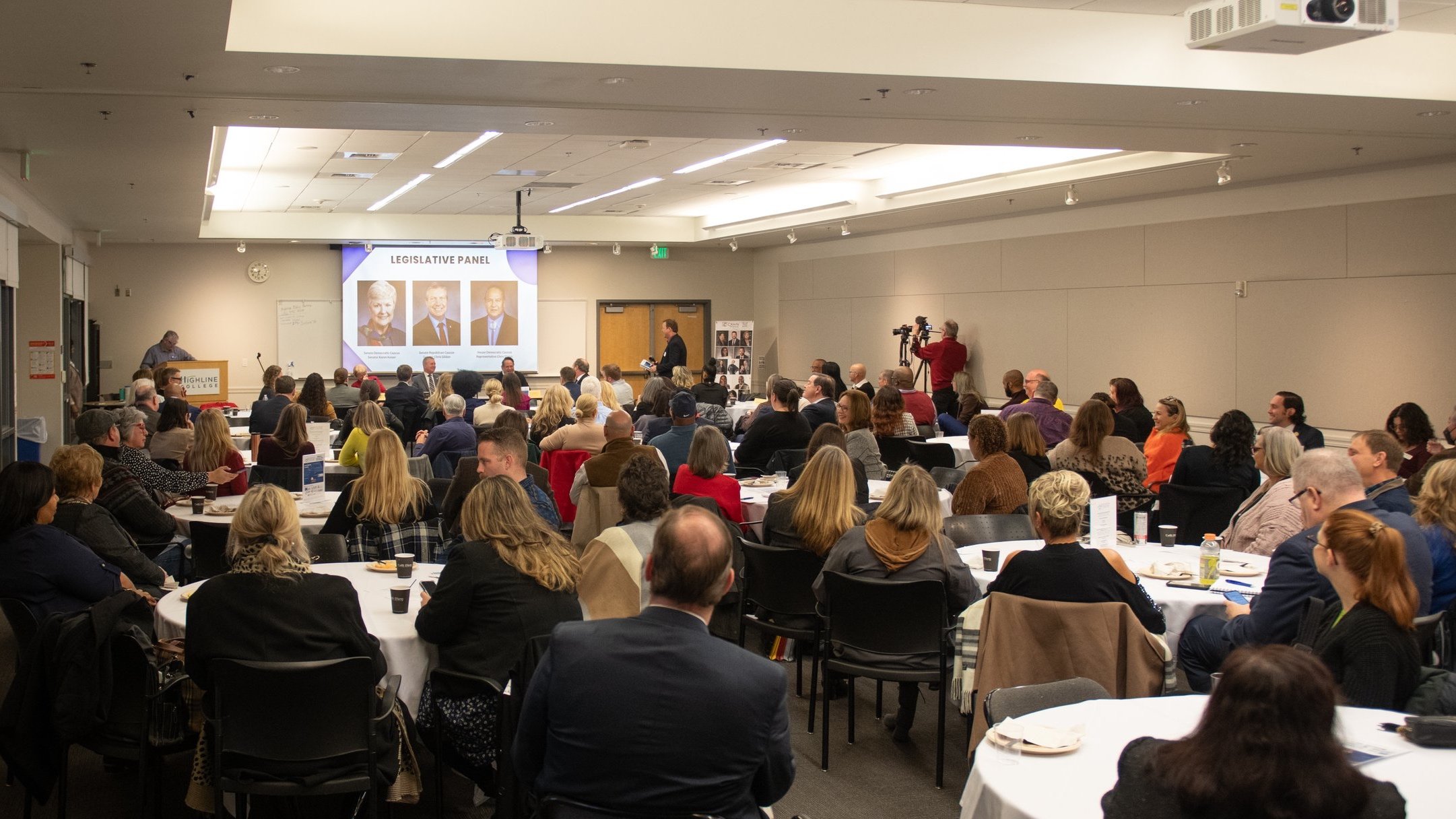2026 INITIATIVEs
The South Sound Chambers of Commerce Legislative Coalition (SSCCLC) remains focused on Economic Vitality and Growth for the South Sound region. Full funding of transportation infrastructure and investments in human beings through education and other workforce policies are keys to our both our state’s, and region’s economic success. But that success will be short-lived without also ensuring that businesses, particularly our small businesses, are not overburdened with taxes, regulations, and other costs.
South Sound businesses are still challenged by labor shortages and continued increases in costs for goods and supplies despite the good economy. We urge our representatives in the Legislature to focus on policies that encourage the economic viability of existing and creation of new firms which will lead to long-term job creation. We need to increase the supply of a job-ready workforce and reduce costs for businesses and citizens who are struggling to make ends meet.
Below are the key issues that our member Chambers believe are imperative for the region:
Transportation | Budget & Taxes
Education | Housing | Healthcare
Small Businesses | Public Safety
Climate Change | Childcare
-
Fully funding transportation commitments continues to be a key economic development priority for the South Sound region, particularly for projects currently underway. The Puget Sound Gateway projects are key to economic development and revitalization in the South Sound. The Legislature must be intentional in recognizing the critical statewide priority for this region which contains significant warehousing and distribution, in addition to an international airport, two international ports, and access to major highways throughout the state. Lawmakers must ensure the Puget Sound Gateway projects remain fully funded for on-time completion. In addition, the South Sound region is dependent on an efficient and expedient ferry system. Not only does this mean building new boats and improving the ferry workforce, for the SSCCLC specifically, it means expansion of water taxi transit in the South Sound region including Vashon Island and investment in public transit and renovation related to the Fauntleroy dock.
-
The Legislature has passed significant spending budgets in recent years. Our businesses are nervous about an economic downturn and how the Legislature would fund on going spending needs with less revenue. The Legislature must reassess budget priorities to avoid the need for new or increased taxes. Spending should prioritize increased job opportunities for our state’s citizens, public health and safety, and other necessary supports. Washington needs to remain competitive for business attraction and retention.
-
Economic development in the South Sound is reliant upon a strong business structure – including small businesses who are people not only creating jobs for themselves, but jobs for others. The Legislature must support these local job creators by actively reducing unnecessary regulations and avoiding new tax burdens. Policies to support local businesses and their employees include:
· No additional regulatory requirements or standards for independent contractors. These are the people who are working to create their own businesses due to recent tech-sector layoffs and scarcity of attainable housing near existing job openings. Businesses who use independent contractors are often other small businesses. Now is not the time to revolutionize employment law. This includes provisions that would require businesses to track independent contractors for child support enforcement purposes. This is a burden on businesses, particularly small businesses, whose relationship with independent contractors is often short-lived.
· Avoid all increases to employment-related costs. Washington state has some of the most expensive wage and hour policies in the country and has aggressively passed several new employment mandates in recent years. We need all businesses, but particularly our small businesses, to hold onto the employees they have and INCREASE their employees now and into the future. The state must not pass laws that increase mandates and costs related to employment.
· Support local Chambers of Commerce. Chambers of Commerce serve to support our local communities and are vital to economic vitality. Many chambers are struggling to overcome financial hardship. We ask the Legislature to show support for these organizations by providing companies tax credits, such as credits against local and state B&O taxes) for expenditures supporting these organizations.
-
The state made significant investments in our human infrastructure to help with pandemic recovery. Now, with pervasive workforce shortages, the Legislature must ensure the right investments are made in education and training, including on the job training opportunities. Multiple pathways should be available for individuals looking to get into all trades and professions. An expanded, well-trained, job-ready workforce must be available for our economy to be successful.
· K-12 Education: K-12 funding should remain steady and support districts providing students with all learning methodologies available. School districts should be given flexibility with their levies to ensure they can fill funding gaps as necessary based on the needs of their students. The SSCCLC believes it is important to provide appropriate secondary transition instruction and planning for developmentally disabled (DD) students ages 18-21 to ensure they can be independent and employable. We support legislative changes proposed by the DD community to ensure proper funding and accountability.
· Career and Technical Education/Workforce Education: The Legislature should ensure that adequate education dollars continue going to CTE programs and that all students/displaced adults have access to relevant CTE courses and workforce development programs, including pre-apprenticeship programs.
· Higher Education: Education pathways that facilitate economic growth (including certificate programs, licensing and apprenticeship programs, Associate, and Bachelor degrees) have a high value for the South Sound region. These programs and pathways needed to complete these programs should be a funding priority for the supplemental budget. Barriers to training, apprenticeship, and other programs should be removed if they do not ensure all businesses can participate.
-
The SSCCLC commits to working in partnership with Legislators and stakeholders to ensure housing is attainable for ALL economic segments of the population in the South Sound region. This is important to attracting and retaining businesses and the workforce for those businesses. Legislators should resist rent control, looking instead for solutions that do not pit landlords against tenants and recognizing the impact of costs on both. Housing proposals supported by the SSCCLC include:
Amendments to housing and land use regulations: The state Growth Management Act should be amended to help eliminate the current housing supply deficit, and to accommodate the future market demand for housing. Additionally, the Legislature should create financial and legal incentives to achieve housing goals. In the 2025 session, this should mean an emphasis on infrastructure funding for cities; incentives, not mandates for TOD; and incentives for ADUs. Finally, the Legislature should repeal the HOA-CC&R exemption from new housing supply mandates. That exemption from accommodating housing unfairly favors more affluent cities and neighborhoods, potentially restraining access to affluent communities by historically marginalized households.
Transit Oriented Development (TOD): Comprehensive plans under the Growth Management Act should be amended to accommodate 50 years of population growth instead of the current 20-year growth planning period. The Legislature should provide cities with some stability in TOD mandates so that actual construction of TOD housing can move forward in the next 24 months.
Multi-Family Tax Exemption (MFTE): The Legislature should provide flexibility and incentives for cities to participate in the MFTE and extend the MFTE to 20 years rather than the current eight to 12 years.
The Legislature should continue to pursue policy changes, such as lot-splitting, to establish smaller lot and/or smaller unit size products to increase affordable ownership opportunities in a manner that is consistent with the existing community.
-
As utilities continue to face a transformational change in their industry, responding to evolving customer expectations and rapidly changing technological advancements, policymakers need to ensure utilities can be nimbler in a rapidly changing marketplace. Utilities must be responsive to market changes, as well as customer desire for real-time adoption of emerging technologies that allow for greater control over energy choices, cleaner and greener power – all while maintaining an affordable low cost. Policies encouraging the use of performance and incentive-based regulation, along with appropriate compliance tools ‒ to aid in the reduction of greenhouse gas emissions on the electric grid ‒ must be advanced to allow for transformational changes in the utility sector.
· Transmission siting & permitting: As the state works to bring more renewable energy online, several new transmission lines are needed. Continued work to expedite the siting[DN1] and permitting of these lines are a priority.
· Keep housing and utility costs affordable by avoiding policies that reduce fuel choice. Instead, focus on consumer education, appliance efficiency, and new technologies.
[DN1]Should this be “site permitting”?
-
Public safety is an important part of community vitality and economic growth. Our businesses, employees, and customers must feel safe. In addition, retail theft issues – which have been increasing – do not just result in increased prices, labor shortages and store closings. They also make our citizens less safe, decrease access to necessary products, and increase food and other product prices which hurt all South Sound citizens, particularly those with fixed or low incomes.
We urge the Legislature to immediately work on solutions that do the following:
· Improve and increase public safety funding, including increasing police presence, access to mental health and drug addiction services, more prosecutors, and sufficient public defenders.
· Help retailers by passing policies that give them tools to make their stores, employees, and customers safer.
· Enact legislation that will stop organized retail crime rings and remove access to sell stolen products through online and other sources
-
Health care expenses and access remain an issue for both businesses and their employees. The cost of health care and the ability to access providers must be a priority for the Legislature. An operational hospital care system is key to any community and the South Sound is no exception. The SSCCLC supports policies and funding that will help hospitals increase their workforces and improve their ability to effectively treat the citizens of our region. In addition, the Legislature must work to increase the insurance premium share that goes to direct patient care to help our workers get the most from their health care premiums rather than paying for skyrocketing administrative costs. Focus on provider reimbursements and ability for patients to receive care regardless of network or location within the state will help increase access to care.
-
Another component of a healthy workforce in the South Sound region is the availability of affordable childcare. More and more workers are having a hard time finding affordable, available childcare. The SSCCLC will review and supports efforts that include the following but do not require additional employer taxes or employee/employer-specific funding:
· Increase the number of childcare slots and providers
· Reduce regulations and regulatory costs which stifle growth in the childcare industry that are not necessary for maintaining a healthy, safe, quality system
· Ensure a robust, private childcare and early learning market
· Support tax incentives and tax credits for businesses who help employees with childcare


